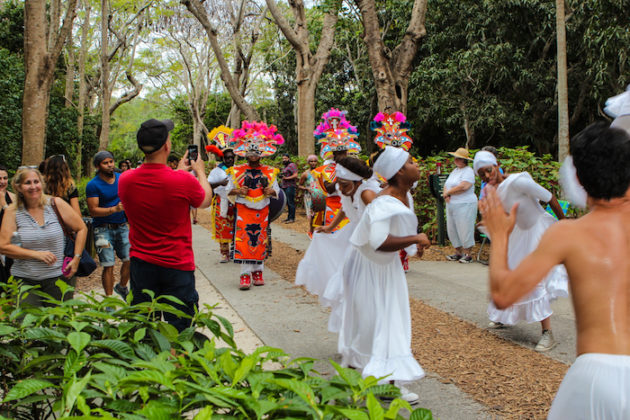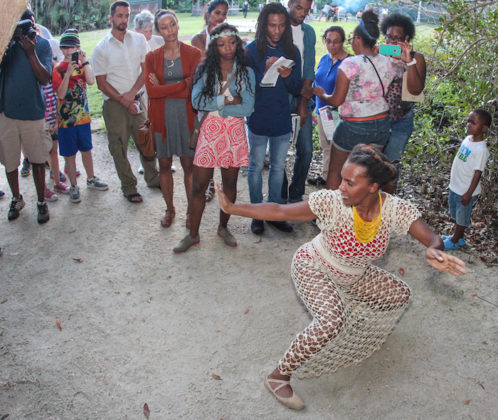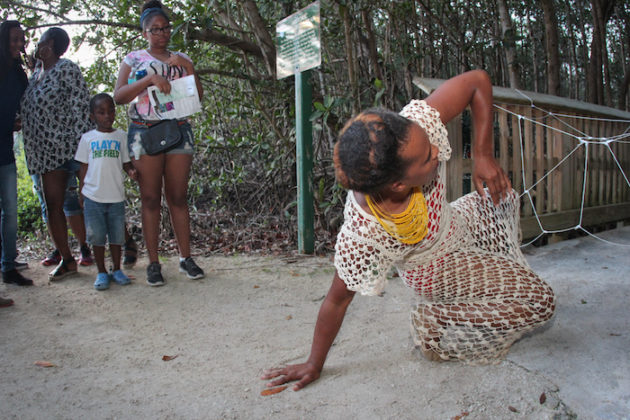|
Getting your Trinity Audio player ready...
|
With contributions by Michelle Grant-Murray
The Black Artist Talk program is dedicated to engaging conversation with Black artists to discuss current event, the arts, dance making, pedagogy, social justice, history, the future, the here and now. The Black Artist Talk was first developed by Michelle Grant-Murray, an Artist in Residence at Deering Estate.
On October 17, Deering Estate will present a virtual session of The Black Artist Talk surrounding the decolonization of the artistic spaces. It will be hosted by Michelle Grant-Murray along with panelists: A’Keitha Carey, Augusto Soledade, Melissa Cobblah-Guiterrez, Florencia Guerrier, and Tiffany Merritt-Brown.
These panelists come from different professional dance backgrounds which will make this experience dynamic and thought-provoking. From A’Keitha Carey’s work in the CaribFunk technique to Michelle Grant-Murray’s Olujimi Dance Theatre, each artist will bring a distinct perspective that explores the expression of Black culture as a conduit for education, ecology, sustainability, and social justice. During the talk, the panelists will address the various issues regarding the colonization of artistic dance spaces and provide solution-based concepts to generate equity and equality. Innovative ways to strengthen dance practices and enhance inclusivity within dance curriculums, performances and rehearsal spaces serve as the core of this Black Artist Talk. This is a conversation for dance practitioners of all ages and backgrounds -Dancers, Performers, Choreographers, Dance Teachers, Parents, Presenters, Dance Therapist, Dance Scholars, Dance Enthusiast are welcome and encouraged to participate. Dance practitioners from the presenting agents, dance studio, colleges/universities and conservatory-based programs will find information that is beneficial and helpful with policy and decision making, teaching strategies, presentation formats, choreographic tools, and mentorship.
Here are some questions answered by Michelle Grant-Murray on her movement and the decolonization of artistic spaces:
Q: What inspired you to start the Black Artist Talk?
A: The Black Artists Talk was inspired by conversations with other Black and Brown Dance Artists in the community, nationally, and internationally. These conversations were sparked by the sensibilities of Black bodies in artistic spaces, the complexities and authenticity that exist within culture and how this information was celebrated, heightened, intuitive and often appropriated. This included conversations connected to spirituality, physicality, embodied wisdom, science, business, and ecology.
Q: What do you hope people gain out of listening and participating in these events?
A: This particular “Black Artists Talk” experience will provide details about the value, importance, relevance, benefit, and respect of Black Professionals in dance spaces in Florida and beyond. These include policy making, executive direction, performances, decision making, arts administration, academia, and dance making. The panelists will present critical dialogue that addresses the decolonization of dance performance spaces, arts administration, dance assessment, and dance curricula in higher ed and K-12.
Q: Why do you consider the decolonization of artistic spaces to be an important matter?
A: This is a great question. Are Dance spaces practicing and working in alignment with an Anti-Racist theories, philosophies, and applications? Decolonization is essential! Dance spaces have the capability to revolutionize the mind, body, and spirit. Most “non-western” dance work is viewed as challenging, complex, and problematic. “Dance from all perspectives, rooted in a particular culture, community, tradition, and spirit, should be supported.” (Alternate Roots) Supporting and building equitable relationships with other races and ethnicities provides personal introspection and intersectionality of humanity which directly affects the social, economic, historical, philosophical, and culture of communities. Dance is a global language used for sacred/spiritual practices, entertainment, rites of passage, births, weddings, naming ceremonies, planting and harvesting, etc. Exploring the footprint of colonization upon humanity is crucial to understanding systemic oppression and suppression. Examples of the questions that will be addressed at the Black Artist Talk are: what do colonize dance spaces look like? What are ways to decolonize dance spaces? What are the long-term effective measures to ensure that Dance as an art form and means of communication include citizenship, humanity, diversity, and modernity? Movement is the fundamental human expression of life and dance carries the history and culture of humanity.
Q: Is dance having more issues in regard to the colonization of artistic spaces compared to other art expressions?
A: Yes. This question is particularly unique because we have to access, explore, examine, and engage in global dance spaces. Miami’s “professional” dance community is dominated by White and White passing Latin X dance companies. Unlike NYC, Dallas, Denver, Atlanta, Chicago, and LA; We do not have a full-time professional Black Dance Company here in this city (Miami) or Broward County. Black dancers should be better represented in the community and classrooms, on stage, in arts administrative roles and Board of Directors/Trustees.
Q: Do you feel like minority artists are underrepresented in the industry? If so, what do you think could be done to change that?
A: The Dance industry is complex in nature. As a dance maker, choreographer, innovator, educator, dance scholar, mentor, mentee, Caregiver, Mother, Wife and a Black Woman; I am constantly questioning and examining concepts of creativity involving everything from cooking to paying bills. I have experienced systemic oppression, racism, and tokenism in this industry on many levels. I have asked myself on many occasions, “is my Black Body being used as a method of tokenism to meet the standards of diversity?” Black dancers have always been underrepresented in mainstream Dance spaces from educational institutions to presenting agents. Black Dance companies and Black Dance Organizations have been created to fill the void. They bridge the gap and provide a safe space for Black people to celebrate the corporeality of the Black Dancing Body. To change the reality and create a community that embraces REAL diversity; a paradigm shift is needed in the leadership and decision-making positions within Arts Funding Organizations, Board Members, Executive Directors and presenting agents. These thoughts lead me to think and consider on many topics. How are community leaders, arts administrators, and dance presenters assessing professional dance companies, dance presenters, and dance curriculum? What are the tools of measurement and who generates the assessment tool? How many Black people are on the assessment committees? What accountability factors are in place to balance the process of inclusivity? These questions are presented as a contemplative process of self and community reflection that will shift the narrative and write a new history.
Through these Black Artist Talks, the art industry can continue to be as diverse and embracive as it was intended to be. Join the talk on October 17 at 2 PM. It is free and open to everyone on Zoom, RSVP via Eventbrite.com.











